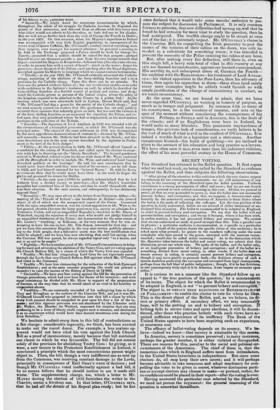SECRET VOTING.
THE Standard has returned to the Ballot question. It first copies what we said last week, on being called by the Standard as evidence against the Ballot, and then subjoins the following -observations.
" After giving all the attention to this criticism which the very sincere respect we entertain for our contemporary commands, we are still unconscious of any fallacy in the reasoning of the Standard upon the ballot question. Uniform coexistence is a strong presumption of effect and cause ; but we are not Scotch enough to pretend to such refined reasoning in this ease. All that we pretend to prove, all that we ever pretended to prove is, that the ballot does not necessarily prevent bribery and corruption; anti this, we suppose, is demonstrated satis- facturily by the notoriously corrupt elections of America in those States where the ballot is the merle of collecting the suffrages. Let the true position of the question be fairly understood, before we are accused of either intentional or on- designed false reasoning. The ballot is recommended to be adopted in England, in order to prevent bribery and corruption. We say that the ballot will not prevent bribery and corruption ; and we say it because, where it ha-s been tried, in eadem materia, it has not prevented bribery and corruption. We confess that we can understand no mode of proof stronger than this. Take a parallel case in physics : a particular medicine is recommended, as a specific in a particular disease ; a friend of the patient denies the specific virtue of this medicine ; he is asked upon what ground ; he points to the numbers suffering under the same complaint who have passed to the grave, saturated with the nostrum recom- mended; would this be called unfair reasoning ? As to the distinction which the Spectator takes between the ballot and secret voting, we submit that this distinction proves our whole case. We spoke of the ballot, and the ballot only, as an inadequate preventive of bribery and corruption; and if the ballot is a something distinct from secret voting, in other words, if the ballot does not insure secrecy in voting, it certainly cannot prevent bribery and corruption, though it may serve greatly to promote both—the fictitious secrecy of stieli a system doubtless protecting the corruptor and corrupted from legal consequences,
i
perhaps from the full blast of public indignation; though, if it be but fictithitis, as our contemporary truly says it is in America, it can impose no restraint upon either."
It is curious to see a reasoner like the Standard follow up an appeal to " the true position of the question," by a misstatement It is curious to see a reasoner like the Standard follow up an appeal to " the true position of the question," by a misstatement of its terms. The object fbr which the Ballot is recommended to be adopted in England, is not "to prevent bribery and corruption." The object is, TO OBTAIN FREE ELECTIONS OF REPRESENTAtIVIBt IN PARLIAMENT—t0 enable the elector to vote for whom he lik 13. This is the direct object of the Ballot, and, as we believe, its rect or primary effect. A secondary effect, we may reasonah hope, will be the putting an end to bribery and corruption. If bribing fails to secure votes and carry elections, it will be discon-
tinued, after those who practise bribery with such views have sit- . quired sufficient experience of its inefficacy The Bank of the United States appears to have been acquiring such an experience, at enormous cost.
The efficacy of ballot-voting depends on its secrecy. We be- lieve—indeed we know-that secrecy is attainable by this means.
In America, secrecy is sometimes preserved ; in many instances, perhaps the greater number, it is either violated or disregarded. There are reasons for this, peculiar to the social and political cir- cumstances of the Americans. The chief of them is, that the numerous class which in England suffers most from intimidation, in the United States luxuriates in independence. But since some electors do, all may keep their own secret; and it will perhaps become advisable to take measures and adopt machinery for com- pelling the votes to be given in secret, whatever disclosures parti- san or corrupt electors may choose to make—or pretend, rather, for no confidence could be placed in their report—after the voting is over. Having answered the particular case selected by the Standard, we need not pursue the arena-lent: the general reasoning of the question is somewhat threadbare.


















 Previous page
Previous page